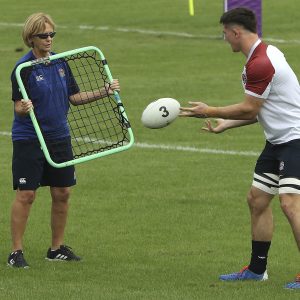Hail the sports pioneers daring to break the mould
There has been a noticeable rise in the number of women coaching men in professional sport across the globe. But is this positive trend an honest effort and can it be sustained?
Author:
10 May 2021

Becky Hammon made history on 30 December 2020 when she became the first woman to serve as the head coach of a National Basketball Association (NBA) team during a regular season game. The assistant coach of the San Antonio Spurs took charge after head coach Gregg Popovich was ejected from the game against the Los Angeles Lakers during the second quarter for arguing a no-call with a referee.
The incident shone the spotlight again on the increase in the number of women who have been promoted to coaching men’s teams across multiple disciplines at the highest level. In February, Liz Mills became the first woman to be the head coach of Kenya’s men’s national basketball team. The Australian helped them qualify for the International Basketball Federation (Fiba) AfroBasket continental championship for the first time in 28 years after they beat 11-time champions Angola.
Mills is the second woman to be the head coach of a men’s national basketball team in Africa. She has followed in the footsteps of Brigitte Affidehome Tonon, who coached Benin at the regional 2017 Fiba AfroBasket qualifiers. In the National Football League (NFL) in the United States, Kate Sowers became the first female and openly gay coach in 2019, serving four seasons as offensive assistant to the San Francisco 49ers.
Related article:
Tampa Buccaneers became the first team in the history of the NFL to have two women – Lori Locust and Maral Javadifar – serve as assistant coaches. The women joined the Buccaneers in 2020 and helped lead the team to victory in the 2021 Super Bowl in February during their second seasons. A week before that Super Bowl, the Washington Football Team promoted Jennifer King to assistant running backs coach, making her the first Black woman to be hired full-time in an NFL team.
In March, former England women’s international cricketer Sarah Taylor was appointed as the wicketkeeper coach for Sussex Men’s County Cricket Club, becoming the first woman to coach in English professional cricket since the inception of the County Championship in 1890.
These appointments signal a significant shift in how women were and still are viewed as coaches. But although it seems like a progressive and positive trend, there is still a strong patriarchal culture sustained in sports that makes it difficult for women to thrive.
Winning over the players
When establishing a coaching philosophy, women who coach men need to consider more than just tactics. A qualitative study done by Ball State University in Indiana in the US explains that some coaches tend to adopt more masculine characteristics. It says that women who tend to be more aggressive in their approach are either trying to make a strong impression or emulating male coaches who have influenced them.
Lydia Dumond, current coach of the Vaal River Lions wheelchair basketball team and former coach of the men’s national team in the sport, says working as a police officer has informed the way she trains her players. “I’m very strict and follow my own ideas, but I’m open to other ways of doing things as well. I stuck to what I knew worked and planned around it,” explained Dumond. “That’s what I tried to incorporate into the national side, but it was difficult because I was seen as a girl. [After a while] players saw that I knew a bit and it became easier.”

In contrast, Mills says gender dynamics do not inform the way she coaches or develops relationships with her players. “Whether a player is male or female, it is irrelevant [to me]. I do understand, though, [that] the men I coach … can be nervous or apprehensive about their first experience with me, as a majority – if not all – of these men would never have been coached by a woman. As long as I can show that I know what I’m doing, that I can help them improve, players soon realise that me being a woman is also irrelevant.”
Dumond had a completely different experience with her male players. “In the beginning it was hard. They did not take me seriously, but it came right in the end. I believe that if you respect your players then they will respect you. They took their chances, believe you me, and then I would shout and scream and swear. I swear a lot. But in the end we formed a family and not just a team. I will cherish that forever,” she says.
Breaking new ground
Amélie Mauresmo became a trailblazer in the world of tennis in 2010, when the Hall of Fame inductee and two-time Grand Slam winner was temporarily hired to coach fellow French player Michaël Llodra. She coached two other top world players before being hired as British player Andy Murray’s full-time coach in 2014.
This made her the second woman in the history of the ATP Tour to coach a top-10 player. Under Mauresmo’s tutelage, Murray won eight singles and three doubles titles while also reaching the final at the Australian Open in 2015. He also led Britain to the Davis Cup title for the first time in 79 years.
And while Mauresmo’s accomplishment was historic in many ways, she stood alone at the highest level of sport for a few years.
This changed in May 2014 when Helena Costa became the first woman to be hired as the manager of a French professional football club, the second division Clermont Foot 63. In the following years, there would be more appointments of women in professional football across the globe. In 2016, Chan Yuen Ting became the first woman to coach – and win – the Hong Kong Premier League, entering the Guinness Book of World Records as the first woman to win a top-flight title in men’s professional football.
Related article:
The strides that women have made in sport are easily overshadowed by some of the challenges they counter from administrations, players, media and fans. This is perfectly shown by Costa’s experience as football manager of Clermont Foot 63. After being employed, the Portuguese coach reported that she was met with discriminatory behaviour from colleagues and often had clashes with Olivier Chavanon, the sporting director and adviser to club president Claude Michy.
In a statement issued in June 2014, only a month after her appointment, Costa outlined how the Frenchman had signed players without consulting her. “There were a series of events that no trainer would tolerate and a total lack of respect as well as amateurism,” she said.
Costa handed in her resignation and was replaced by Corinne Diacre. To add insult to injury, Michy made a sexist statement during a press conference to explain her departure. “She’s a woman so it could be down to any number of things. But we have to accept this astonishing, irrational and incomprehensible decision… It’s not the first time a man has been dumped by a woman,” he said.
Dealing with negativity
In Mauresmo’s case, she had many negative interactions with the media and fans. They often questioned her ability to coach Murray and she was blamed when his performance was poor. The two agreed to part ways after two years.
It is common for women to experience intense scrutiny when placed in coaching positions. “It felt like [some of the] previous players and coaches were watching and waiting for me to fail,” says Dumond of her time with the men’s national wheelchair basketball team. “It was difficult since I did not ask to be named head coach of the team. I was asked to take up the role, otherwise we would have not gone to the Dubai Tournament. I did the best I could.”
The blowback that Dumond experienced is a dynamic that Leanne Norman, professor of sport and sociocultural studies at Leeds Beckett University in the United Kingdom, calls the “sense of being second best”. In her study, Feeling Second Best: Elite Women Coaches’ Experiences, she discusses how women are made to feel like subordinates despite their qualifications.

Dumond agrees with Norman’s assertions. “During some tournaments overseas, the other teams did not recognise me as the coach. I sometimes felt out of my depth as these coaches had been doing it far longer than me and I felt like I had nothing to contribute.”
It is not surprising that, in some instances, women do not hold coaching positions for long. Research into sports management done by Americans Dorothy Lovett and Carla Lowry indicates that the exodus of women in coaching is influenced by covert discrimination, time limitations and a lack of support.
“The development and integration of women into sport has to be done correctly,” Dumond says. “You cannot throw someone into the deep end and expect them to swim. Pressure plays a big role and if you don’t have the right support from the federation and the other parties, you will not make it.”
Fad or future?
Employing more women in the major sporting disciplines is a promising sign. However, the progress is glacial and there is still a large imbalance between the genders. Women represent less than 3% of the head coaches in men’s sports.
A 2017 report from researcher David Lange of Statista revealed that women holding a Uefa A coaching licence was less than 2% of all licence holders. In the 2019 Fifa Women’s World Cup, only nine of the 24 participating countries were coached by women. No woman holds a post managing the men’s football team at senior national level.
The latest data from the Institute for Diversity and Ethics and Sport, which is based at the University of Central Florida in the US, are also not encouraging, revealing that women hold fewer than half of the head coaching positions for women’s teams and fewer than 6% of coaching positions for men’s teams across the four biggest sporting disciplines in the country. This shows that men are given more opportunities in women’s sports but women are underrepresented in men’s sports.
Related article:
Richard Lapchick, activist and author of the institute’s Racial and Gender Report Card, offers a damning assessment of these statistics in a 2020 report. “It has been 48 years since the passage of Title IX and the coaching statistics in women’s sport remain the worst diversity statistics in sport,” he says, referring to the federal civil rights law in the US that prohibits sex-based discrimination.
In the past five years, organisations like football world-governing body Fifa and the International Olympic Committee have created development and leadership programmes to increase the presence of women in sports management. And that is important. But the efforts may be rendered fruitless if these programmes are not applied, at least in the opinion of Masai Ujiri, president of basketball operations for the NBA team Toronto Raptors.
“People see hiring women as an obligation. It is not that to me, it is an opportunity,” the Nigerian Canadian told Olympic Channel, an internet-based television service. “Women’s empowerment is not just talking about it, it’s doing it. We have to do it. There are incredible, smart, diverse women everywhere. It’s just a matter of equality and the chance that they are given.”



